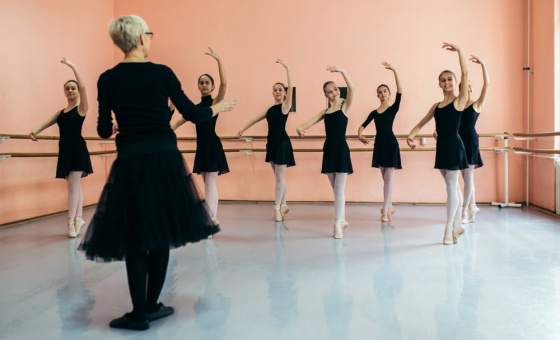
Description
A choreographer is a person who creates a design and directs routines by the physical movements, actions or forms of bodies to deliver creative ideas and emotions. He practices the art of choreography which could be implemented in the fields of dancing, fashion shows, gymnastics, synchronized performances of swimming or marching, cinematography, theatre, ice skating, cheerleading, video game and animation production, choir, and other performing arts
Common Duties/Routines
- Active Learning:
Before thinking of a plan to execute and rehearse a performance, a choreographer meets the director to learn about the idea behind the performance so that he could implement the best possible technique to stage the show. Active learning and listening skills make him understand the concept better, so he could be able to deliver a standing-ovation- worthy performance.
- Creation and Invention:
After getting the concept of the performance, she should be able to create new routines or use the old ones with a twist, sometimes a fusion of two also works. The artistic side of the choreographer is what catches the attention of the audience. The fusion of brainstorming ideas with the perfect costumes and music completes a performance.
- Casting the Performers:
One of the most important responsibilities of a choreographer is to cast the right people for the right role. A perfect cast would be able to deliver a synchronized, seamless performance, while a cast that doesn’t fit would just be a disaster on stage.
- Risk Taking:
A choreographer plans out the whole performance before giving instructions to the cast. Some choreographers write or sketch down the steps beforehand. Sometimes things don’t go according to the plan, for example, last-minute injury of a performer. In such situations, a choreographer must be disciplined and brave enough to take risks and should be able to alter the performance accordingly.
- Collaboration:
A choreographer must collaborate with the music director and costume designer to make them understand the concept he holds in his mind. For the completion of the whole performance, there must be a proper understanding among all cast and crew members of the show.
- Demonstration:
A choreographer must be able to demonstrate the routine he planned for the group of performers. Before rehearsals, a proper explanation of the idea and concept behind the show is what adds the essence to the actual performance. After that, teaching them the perfect steps of the routine at the proper timing with the right technique is another duty of a choreographer.
- Assistance and Management:
A choreographer must assist the students or performers to learn the right steps or should guide them about the styles they should work on to excel in the future. They should be mentors to the minors. They should also time manage the rehearsals, so the actual performance could be ready before the time for a flawless on-stage appearance.

Required/Trained Skills
Choreographers usually work on sets with actors, dancers, models, directors, and producers to invent sequences that are likely to convey a specified idea or emotion. Their skill is based on the years of performance and experience they gained in a genre.
- Technique:
A choreographer must have experience and knowledge about the styles and genres of the performance he chooses to direct. Directors hire a choreographer so that he can make the group deliver to the audience, the idea behind his creation. The best way to do that is to pick a style which conveys the whole thought with the body language required to express it. A choreographer must cast the performers in the roles which they can personally and emotionally absorb.
- Leadership:
Good leadership quality is something every trainer or teacher should possess. A choreographer with no leadership qualities will only deliver an unsynchronized, messy performance. The groups of performers need an individual with good leadership skills to execute an idea in the best possible way.
- Communication skills:
A choreographer must possess good communication skills to provide clear direction to the performers. Failure to communicate with the performers could possibly result in uncoordinated performance with an improper expression of the actual idea.
- Time Management:
Time management is another important trait for a choreographer. He should be able to manage the rehearsals in a way that the actual product or performance should be delivered flawlessly to the audience; for that he should plan a test-run one day prior to the actual show.
- Creativity:
The career of a choreographer relies upon his creativity. The uniqueness in which he delivers an idea, even an ordinary one, is what makes him shine among others. A creative way of expression of a basic story can sometimes steal the show. His aesthetic could be reflected in the styles, costumes, and routines he picks. The risk that he takes to experiment with his artistic abilities makes him different.
- Social Perceptiveness:
A choreographer must be aware of the reactions of the audience whilst and after watching the performance. He must know his audience to implement a particular style for the expression of an idea. For that, he must be socially smart to know which social group he’s showcasing the performance to.
- Fitness:
The choreography is a profession which needs time and sweat. The audience pays a lot to watch a movie, theatre or any performance. To make it worth their money, choreographers rehears hours and hours to make the performers execute the performance flawlessly. For that, a choreographer must be physically fit and disciplined on sets to monitor every move for an ultimate mind-blowing performance.
Salary/Compensation
Salaries in the field vary according to the level of art you deliver. They could also vary according to the type of your job, for example, if you’re working on a freelance basis, the salary structure would be different as running your own company or affiliating with a reputable one. According to the U.S. Bureau of Labor Statistics (BLS), a median choreographer earns up to $45,940 annually, as per 2015. While the highest paid ones earn up to $95,100 and the lowest paid made over $20,000
Skillset 3
Skillset
HARD SKILLS
- Creativity and imagination
- Dancing skills
- Discipline


